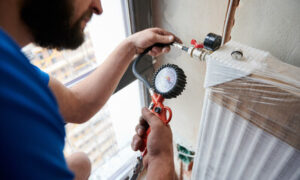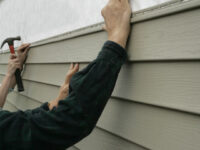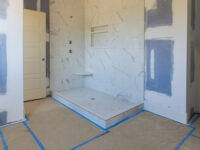How to Spot Gas Leaks
Gas Leaks NYC are not something to mess around with. If you suspect you have a natural gas leak, evacuate the area immediately and remain out of the building until given the all-clear by the gas company. Do not use anything electronic, including light switches and cell phones, as they may trigger a spark that could ignite the leaking gas.
Natural gas and propane are valuable household fuels that can help warm homes, cook meals, power appliances, and heat water. However, these highly flammable gases pose a serious threat when they leak and can cause fires or explosions. Knowing how to spot a gas leak is the first step in keeping your family and home safe from this dangerous problem.
A gas leak is the unintentional escape of natural gas from a piping system or pipeline, typically due to damage or age. These leaks may occur either inside or outside of your property, depending on the location of the leaking pipe. Indoor leaks can be caused by a number of factors, including damage from construction or renovation work that damages the gas line, or a faulty appliance.
If you suspect that you have a gas leak, the most important thing to do is to evacuate the area and turn off your gas supply at the meter. Immediately after you’ve done this, call the local gas company to report the problem and ask them to send someone to locate and fix the leak as soon as possible.
A natural gas leak is usually accompanied by an unpleasant odor similar to rotten eggs. This distinctive odor is added to natural gas to make it easier for people to detect when there’s a leak. The odor may also be accompanied by a hissing sound or the sound of an audible rumble when the gas is escaping from the leaking pipe.
In addition to being a dangerous hazard, gas leaks can also be harmful to your health. Natural gas can change the amount of oxygen available in your home, which can lead to symptoms like fatigue and nausea. If these symptoms aren’t addressed quickly, they can become more severe and even fatal.
Another danger associated with gas leaks is the risk of carbon monoxide poisoning, which can have a range of unpleasant and even deadly symptoms. This can be particularly dangerous for people with respiratory problems, such as asthma or emphysema.
A carbon monoxide detector can be helpful in detecting the presence of this potentially toxic gas, and it is recommended that all homeowners have one installed. In addition, every homeowner should know where the shutoff valve for their gas is located and how to use it in the event of a leak.
Symptoms of a Gas Leak
A slow, undetected gas leak can make you or your family members sick and can even cause death. Exposure to the gas can lead to a variety of symptoms, including headaches, weakness and nausea. If your symptoms persist, you should leave the building immediately and seek medical treatment. A quick fix by a professional is the only way to ensure the safety of everyone in your home or business.
Often, the first sign of a leak is the smell of natural gas in your home or building. If you can smell the odor of gas, open windows and turn off pilot lights or the gas meter. This will prevent any unnecessary exposure to the gas.
If you suspect a gas leak, evacuate the area as quickly as possible. Avoid using phones or any other electrical devices around the suspected leak, as these can generate sparks that ignite the gas and cause an explosion. Also, avoid smoking or starting your car. If you’re unable to evacuate, move to an area with fresh air and close all doors and windows in the affected room.
In addition to a rotten egg or sulfur smell, other signs of a leak include a hissing sound, clouds of vapor, an area of dead plants or grass, and a corroded or damaged gas line. If you’re planning any outdoor landscaping or construction work, call 811 (the national Underground Service Alert network) two working days before beginning to have any buried pipelines mapped.
Symptoms of a gas leak usually occur in the immediate vicinity of the source. If you have a strong odor, open the nearest window and leave the building immediately. Call the fire department or your local utility company from a safe location outside the house.
If you notice a mild odor, keep windows and appliances closed, and call your utility provider. They will advise you on your next steps. Make sure to have your gas pipes and appliances regularly checked by a licensed professional to minimize the risk of leaks. Regular maintenance will help you identify problems before they cause major damage or pose a health and safety hazard.
Signs of a Gas Leak
As a homeowner, it’s important to know how to recognize gas leak symptoms. The most common sign of a gas leak is the smell of natural gas. Most natural gas providers add mercaptan, an unmistakable odor that gives off the scent of rotten eggs, to their product to help you identify any potential leaks. If you notice this odor anywhere near your natural gas appliances or pipes, evacuate the area immediately and call a professional for gas leak repair.
Another sign of a possible leak is if you can hear a hissing sound coming from the source. Leaks may also create bubbles in the soil surrounding the lines. If you can see these bubbles popping up, you should evacuate the area and contact a plumber for gas line repairs right away.
A gas leak can affect the health of both people and pets. You should be particularly attentive if your family members experience unexplained tiredness, headaches or nausea when inside the home. In severe cases, prolonged exposure to natural gas may cause fainting or even death.
Other signs of a leak are visible damage to the gas lines in your yard or near your house, as well as an unexplained increase in your utility bill. Check the gas meter and your utility bills from the past year to see if there has been any changes in usage. A large spike in usage could be a sign of a gas leak or carbon monoxide poisoning from a furnace or water heater that uses natural gas.
If you suspect a gas leak, make sure you and your family evacuate the area right away. Stay away from light switches, appliances and cell phones, which can cause a spark that ignites the leaking gas. Call your gas utility company from a safe distance outside your home, and wait for a certified inspector to arrive and tell you when it is safe to return.
You should also take precautions to prevent a gas leak from happening in the first place. Regular inspections of your gas appliances and lines will keep them in good condition, and you should replace any that are old or showing significant wear and tear. It is also a good idea to have a plumber visit your home once a year to perform routine maintenance and cleaning services.
How to Avoid a Gas Leak
While the most common reason for a gas leak is natural wear and tear or poor installation of appliances, you can take steps to reduce your risk. Keeping your gas lines properly inspected, ensuring that new appliances are installed by an accredited Gas Safe (previously CORGI) engineer and preventing any accidental or intentional damage to gas pipes can help keep you safe from dangerous leaks.
In the event of a suspected or actual gas leak, you should evacuate immediately and inform your neighbors and any nearby residents to do the same. Evacuating will help to prevent any explosions caused by sparks or flammable gases. You should also refrain from using any electrical devices such as light switches, phones or mobile devices, as they may trigger a spark. This also includes smoking or using any open flames such as candles.
Before you evacuate, turn off your gas supply at the main switch that is located near your gas meter. Once you have done this, open windows to let the gas disperse as quickly as possible. Be sure to remain away from any flammable materials, such as dry grass or leaves.
If you smell a foul, sulphurous odour similar to that of rotten eggs or hear whistling sounds coming from the area, these are signs of a potential gas leak and you should leave the premises immediately. If possible, evacuate through the nearest exit and warn others of the odour. Remember that a gas leak is dangerous and requires immediate attention by a certified professional.
While you wait for the professionals to arrive, make sure that all gas-powered appliances are kept well away from any walls or furniture. It is also a good idea to install detectors and alarms on your property in case of a possible leak. A simple alarm will sound if there is any movement or vibration around the gas line. This can save you from potentially deadly carbon monoxide poisoning, fires or explosions that could occur due to a gas leak. If you notice that any of your neighbours’ homes or businesses have these alarms installed, consider having one put in on your property too.






